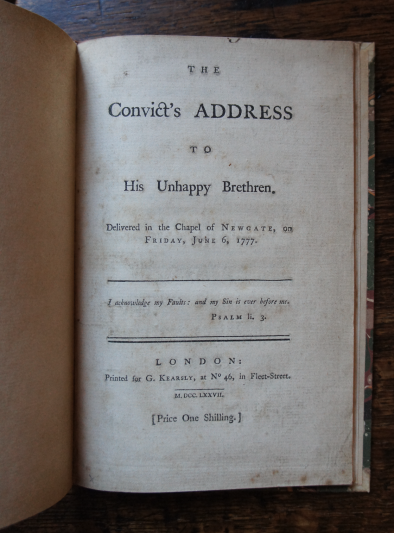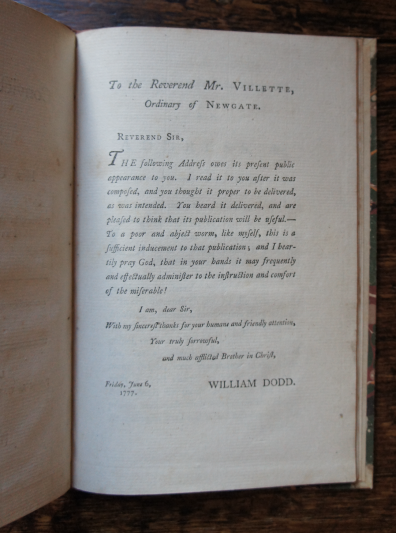Celine Luppo McDaid, Hyde Director and Curator, writes: We are most grateful to FNL for the grant that enabled us to acquire The Convict’s Address. The pamphlet is well known amongst Johnsonians, and has great relevance beyond, in terms of questions of social history, particularly the debate surrounding capital punishment (historic and current).
This piece was written for William Dodd, when under sentence of death for forgery, by Samuel Johnson. It was a very popular text, and there were many editions. The great Johnsonian Bibliographer David Fleeman records 16 of them in 1777 alone, printed not only in London, Dublin and Edinburgh, but also in Newcastle, Salisbury and Taunton. This is the true first edition [pp. 24]. The title page and last page a bit dust-soiled, but a good copy, rebound as a separate volume in modern quarter calf.
This acquisition supports our acquisitions policy, which is to collect works by Samuel Johnson in first edition, and other later editions where notable, or relevant works by those in Johnson’s circle. Although Johnson and Dodd were not close, they were certainly acquainted and had several mutual friends. Although delivered by William Dodd in the chapel of Newgate and credited to him, it was widely known to have been written almost entirely by Johnson and pleaded, albeit ultimately unsuccessfully, against the death sentence being handed out. In April 1751, Johnson had argued against capital punishment for anything other than homicide in his published Rambler essay (No. 114), ‘The necessity of proportioning punishments to crimes’.
This Address has also given rise to a much quoted, and often parodied (though little credited) expression. This occurred in a conversation which Boswell relays in his biography, The Life of Samuel Johnson LL.D (1791), where Johnson is questioned about the originality of Dodd’s Address:
‘Johnson disapproved of Dr. Dodd's leaving the world persuaded that The Convict's Address to his unhappy Brethren was of his own writing. ‘But, Sir, (said I,) you contributed to the deception; for when Mr. Seward expressed a doubt to you that it was not Dodd's own, because it had a great deal more force of mind in it than any thing known to be his, you answered, - Why should you think so? Depend upon it, Sir, when a man knows he is to be hanged in a fortnight, it concentrates his mind wonderfully.’
[For the full text, please follow this link]
This item will allow us not only to add to our significant collection of first editions of Johnson’s work, but also to explore the question of crime and punishment, and the polemical views about capital punishment, in 18th-century London and now. It is not insignificant that Dodd was the last person ever to be hung at Tyburn for a non-violent crime.

